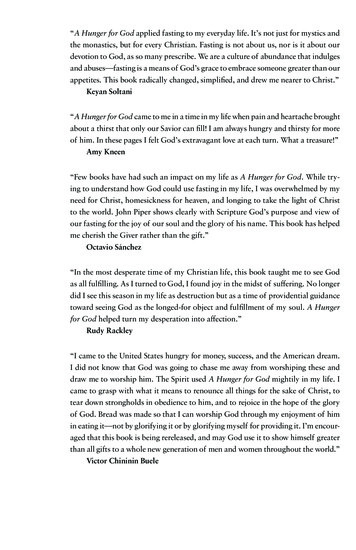
Transcription
Desiring Gor repack TP:Desiring God.int12/3/104:13 PMPage 3JOHN PIPERDESIRINGGODMeditations of a Christian Hedonist
Desiring Gor repack TP:Desiring God.int12/3/104:13 PMPage 4DESIRING GOD, REVISED EDITIONPUBLISHED BY MULTNOMAH BOOKS12265 Oracle Boulevard, Suite 200Colorado Springs, Colorado 80921Scripture quotations, unless otherwise indicated, are taken from the The Holy Bible, EnglishStandard Version, 2001 by Crossway Bibles, a division of Good News Publishers. Used by permission. All rights reserved. Scripture quotations marked (NASB) are taken from the New AmericanStandard Bible 1960, 1977, 1995 by the Lockman Foundation. Used by permission. Scripturequotations marked (RSV) are taken from the Revised Standard Version Bible 1946, 1952 by theDivision of Christian Education of the National Council of the Churches of Christ in the UnitedStates of America. Scripture quotations marked (KJV) are taken from the King James Version.Italics added in Scripture are the author’s emphasis.ISBN: 978-1-60142-310-8ISBN: 978-1-60142-391-7 (electronic)Copyright 1986, 1996, 2003, 2011 by Desiring God FoundationCover design by Kristopher K. OrrCover image by George KavanaghAll rights reserved. No part of this book may be reproduced or transmitted in any form or by anymeans, electronic or mechanical, including photocopying and recording, or by any informationstorage and retrieval system, without permission in writing from the publisher.Published in the United States by WaterBrook Multnomah, an imprint of the CrownPublishing Group, a division of Random House Inc., New York.MULTNOMAH and its mountain colophon are registered trademarks of Random House Inc.Library of Congress Cataloging-in-Publication Data:Piper, John, 1946–Desiring God / revised and expanded by John Piper.p. cm.Includes bibliographical references and indexes.1. God—Worship and love. 2. Desire for God. 3. Happiness—Religious aspects—Christianity.4. Praise of God. I. Title.BV4817 .P56 2003248.4—dc192002154750Printed in the United States of America2011—First Revised Edition10 9 8 7 6 5 4 3 2 1SPECIAL SALESMost WaterBrook Multnomah books are available at special quantity discounts when purchased inbulk by corporations, organizations, and special-interest groups. Custom imprinting or excerptingcan also be done to fit special needs. For information, please e-mail SpecialMarkets@WaterBrookMultnomah.com or call 1-800-603-7051.
Desiring Gor repack TP:Desiring God.int12/3/104:13 PMPage 5Excerpted from Desiring God, Revised Edition by Desiring GodFoundation Copyright 1986, 1996, 2003, 2011 by Desiring GodFoundation. Excerpted by permission of Multnomah Books, a division ofRandom House, Inc. All rights reserved. No part of this excerpt may bereproduced or reprinted without permission in writing from the publisher.Twenty-five years agoI dedicated this bookto my father,W I L L I A M S O L O M O N H OT T L E P I P E R .The sweet indebtedness I still feel to himis now only intensifiedby the joy of knowing that todayhis happiness is sinlessin the presence of Christ.
Desiring Gor repack TP:Desiring God.int12/3/104:13 PMPage 7ContentsPreface . . . . . . . . . . . . . . . . . . . . . . . . . . . . . . . . . . . . . . . . . . . . . . . . . . . . 9Introduction: How I Became a Christian Hedonist . . . . . . . . . . . . . . . . 171. The Happiness of God: Foundation for Christian Hedonism . . . . . . . . 312. Conversion: The Creation of a Christian Hedonist . . . . . . . . . . . . . . 533. Worship: The Feast of Christian Hedonism . . . . . . . . . . . . . . . . . . . . . . 774. Love: The Labor of Christian Hedonism . . . . . . . . . . . . . . . . . . . . . . . 1115. Scripture: Kindling for Christian Hedonism . . . . . . . . . . . . . . . . . . . . 1436. Prayer: The Power of Christian Hedonism . . . . . . . . . . . . . . . . . . . . . . 1597. Money: The Currency of Christian Hedonism . . . . . . . . . . . . . . . . . . 1858. Marriage: A Matrix for Christian Hedonism . . . . . . . . . . . . . . . . . . . . 2059. Missions: The Battle Cry of Christian Hedonism . . . . . . . . . . . . . . . . 22310. Suffering: The Sacrifice of Christian Hedonism . . . . . . . . . . . . . . . . . . 253Epilogue: Why I Have Written This Book: Seven Reasons . . . . . . . . . 289Appendix: Why Call It Christian Hedonism? . . . . . . . . . . . . . . . . . . . 308Group Study Guide by Desiring God . . . . . . . . . . . . . . . . . . . . . . . . . 313Scripture Index . . . . . . . . . . . . . . . . . . . . . . . . . . . . . . . . . . . . . . . . . . . 345Person Index . . . . . . . . . . . . . . . . . . . . . . . . . . . . . . . . . . . . . . . . . . . . . 355Subject Index . . . . . . . . . . . . . . . . . . . . . . . . . . . . . . . . . . . . . . . . . . . . 357A Note on Resources—Desiring God . . . . . . . . . . . . . . . . . . . . . . . . . 365
Desiring Gor repack TP:Desiring God.int12/3/104:13 PMPage 9PrefaceThere is a kind of happiness and wonder that makes you serious.C. S. L EWISThe Last BattleThis is a serious book about being happy in God. It’s about happinessbecause that is what our Creator commands: “Delight yourself in theLORD” (Psalm 37:4). And it is serious because, as Jeremy Taylor said,“God threatens terrible things if we will not be happy.”The heroes of this book are Jesus, who “endured the cross for the joy thatwas set before him;” and the apostle Paul, who was “sorrowful, yet always rejoicing;” and Jonathan Edwards, who deeply savored the sweet sovereignty of God;and C. S. Lewis, who knew that the Lord “finds our desires not too strong buttoo weak;” and all the missionaries who have left everything for Jesus and in theend said, “I never made a sacrifice.”Twenty-five years have passed since Desiring God first appeared in 1986. Thesignificance of a truth is judged in part by whether over time it has transformingpower in very different circumstances. What about the message of this book? Itscontext today is dramatically different from when it was first published.Things have changed personally and culturally. Since its first edition, my bodyand mind have passed from being forty years old to being sixty-five years old. Mymarriage advanced from a seventeen-year-old marriage to a forty-two-year-old9
Desiring Gor repack TP:Desiring God.int12/3/104:13 PMPage 10JOHN PIPERmarriage. My pastorate at Bethlehem Baptist Church has extended from six yearsto thirty-one years. My sons have grown through their single teen years into married adulthood, and they have made me a grandfather twelve times over. In 1986there were no daughters. Now there is Talitha Ruth, whose motto at fifteen is “agirl should get so lost in God, that a guy has to seek Him to find her.”Culturally the world is a different place. Consider some of the events:Tiananmen Square, the collapse of the Berlin Wall, the disintegration of theSoviet Union, Rwandan genocide, Columbine High School, the global AIDSpandemic, Y2K, 9/11, the rise of jihadist terrorism, the ceaseless Middle Eastwars, tsunamis, the historic Obama presidency. Or consider the transformationof popular culture by developments that were not prominent before 1986: laptops, smart phones, debit cards, DVDs, iPods, pay-at-the-pump gasoline, digitalcameras, PowerPoint, Purell, Viagra, flat-screen TVs, public use of the Internet,blogging, Web commerce, YouTube, Twitter, Facebook, and a ceaseless rush ofcomputer-related innovations.In other words, things have changed. This is the world I live in with profound appreciation and serious concern. But, as personally astute and as culturally awake as I try to be, what seems plain to me is that the really important,deep, and lasting things in life have not changed. And therefore my commitment to the message of this book has not changed. The truth that I unfold hereis my life. That God is most glorified in us when we are most satisfied in Him continues to be a spectacular and precious truth in my mind and heart. It has sustained me into my seventh decade of life, and I do not doubt that, because ofJesus, it will carry me Home.Along the way, I added a chapter called “Suffering: The Sacrifice ofChristian Hedonism.” The reason was partly biblical, partly global, and partlyautobiographical. Biblically, it is plain that God has appointed suffering for allHis children. “Through many tribulations we must enter the kingdom of God”(Acts 14:22). “Indeed, all who desire to live a godly life in Christ Jesus will bepersecuted” (2 Timothy 3:12).Globally, it is increasingly plain that a bold stand for the uniqueness ofChrist crucified, not to mention the finishing of the Great Commission among10
Desiring Gor repack TP:Desiring God.int12/3/104:13 PMPage 11P R E FAC Ehostile peoples, will cost the church suffering and martyrs. The post-9/11 worldhas been troubled with terrorism and war. If the message of this book is to haveany credibility, it must give an account of itself in this world of fear and suffering. Increasingly I am drawn to the apostle’s experience described in the words“sorrowful, yet always rejoicing” (2 Corinthians 6:10).Autobiographically, the years since the first edition of Desiring God havebeen the hardest. One of the older women of our church quipped to us at ourtwenty-fifth wedding anniversary, “The first twenty-five are the hardest.” Wehave not found it to be so. We are nearing the end of the second twenty-five,and undoubtedly they have been the hardest.The body ages and things go wrong. Marriage, we found, passes throughdeep water as husband and wife pass through midlife and beyond. We made it.But we will not diminish the disquietude of those years. We were not ashamedto seek help. God has been good to us—much more kind than we deserve. Aswe ended our fourth decade of marriage, I thought I might be far enough alongto write a seasoned book on marriage. It is called This Momentary Marriage: AParable of Permanence.1 The paradox of that title is at the root of what we havelearned. Now, moving through our seventh decade of life and our fifth decade ofmarriage, the roots are deep, the covenant is solid, the love is sweet. Life is hard,and God is good.The other “marriage” in my life (with Bethlehem Baptist Church) has beena mingling of sweetness and sorrow. As I sit here pondering the years, the sweetness so outweighs the sorrow that I have no desire to dwell on the pain. It wasall in God’s good plan—for us and for the people. The apostle Paul spoke adeep pastoral reality when he said, “If we are afflicted, it is for your comfort andsalvation” (2 Corinthians 1:6). But there is a joy without which pastors cannotprofit their people (Hebrews 13:17). Mercifully, God has preserved it for thirtyone years. And the truth of this book has been His means.During these twenty-five years since Desiring God first appeared, I have beentesting it and applying its vision in connection with more of life and ministry and1. John Piper, This Momentary Marriage: A Parable of Permanence (Wheaton, Ill.: Crossway Books, 2009).11
Desiring Gor repack TP:Desiring God.int12/3/104:13 PMPage 12JOHN PIPERGod. The more I do so, the more persuaded I become that it will bear all theweight I can put on it.2 The more I reflect and the more I minister and the more Ilive, the more all-encompassing the vision of God and life in this book becomes.The older I get, the more I am persuaded that Nehemiah 8:10 is crucialfor living and dying well: “The joy of the LORD is your strength.” As we growolder and our bodies weaken, we must learn from the Puritan pastor RichardBaxter (who died in 1691) to redouble our efforts to find strength from spiritual joy, not natural supplies. He prayed, “May the Living God, who is the portion and rest of the saints, make these our carnal minds so spiritual, and ourearthly hearts so heavenly, that loving Him, and delighting in Him, may be thework of our lives.” 3 When delighting in God is the work of our lives (which Icall Christian Hedonism), there will be an inner strength for ministries of loveto the very end.J. I. Packer described this dynamic in Baxter’s life: “The hope of heavenbrought him joy, and joy brought him strength, and so, like John Calvin beforehim and George Whitefield after him (two verifiable examples) and, it wouldseem, like the apostle Paul himself he was astoundingly enabled to labor on,accomplishing more than would ever have seemed possible in a single lifetime.”4But not only does the pursuit of joy in God give strength to endure; it is thekey to breaking the power of sin on our way to heaven. Matthew Henry,another Puritan pastor, put it like this: “The joy of the Lord will arm us against2. If you wish, you can test this for yourself by consulting the books in which I have tried to apply thevision of this book to the nature of God (The Pleasures of God, Multnomah, 2000); the gravity and gladness of preaching (The Supremacy of God in Preaching, Baker, 2004); the power and the price of worldevangelization (Let the Nations Be Glad, Baker, 2010); the daily battle against unbelief and sin (ThePurifying Power of Living by Faith in Future Grace, Multnomah, 1995); the spiritual disciplines of fastingand prayer (A Hunger for God, Crossway, 1997); a hundred practical issues in life and culture (AGodward Life, Multnomah, 1997, and Taste and See, Multnomah, 2005); the radical call to pastoralministry (Brothers, We Are Not Professionals, Broadman & Holman, 2002); the goal of everyday life(Don’t Waste Your Life, Crossway, 2003), the ultimate good of the gospel (God Is the Gospel, Crossway,2005), the reality of the new birth (Finally Alive, Christian Focus, 2009), and the life of the mind(Think, Crossway, 2010).3. Richard Baxter, The Saints’ Everlasting Rest (Grand Rapids, Mich.: Baker, 1978), 17, emphasis added. Ihave been asked so many times what this “work” looks like, that I wrote another book to answer thatquestion with as many specifics as I could. It is called When I Don’t Desire God: How to Fight for Joy(Crossway, 2004) and is meant to be a fuller application of what I have written here.4. J. I. Packer, “Richard Baxter on Heaven, Hope, and Holiness,” in Alive to God: Studies in Spirituality, ed.J. I. Packer and Loren Wilkinson (Downers Grove, Ill.: InterVarsity, 1992), 165.12
Desiring Gor repack TP:Desiring God.int12/3/104:13 PMPage 13P R E FAC Ethe assaults of our spiritual enemies and put our mouths out of taste for thosepleasures with which the tempter baits his hooks.”5This is the great business of life—to “put our mouths out of taste for thosepleasures with which the tempter baits his hooks.” I know of no other way totriumph over sin long-term than by faith to die with Christ to our old seductions, that is, to gain a distaste for them because of a superior satisfaction inGod. One of the reasons this book is still “working” after twenty-five years isthat this truth simply does not and will not change. God remains gloriously allsatisfying. The human heart remains a ceaseless factory of desires. Sin remainspowerfully and suicidally appealing. The battle remains: Where will we drink?Where will we feast? Therefore Desiring God is still a compelling and urgentmessage. Feast on God.I never tire of saying and savoring the truth that God’s passion to be glorified and our passion to be satisfied are one experience in the Christ-exalting actof worship—singing in the sanctuary and suffering in the streets. Baxter said itlike this:[God’s] glorifying himself and the saving of his people are nottwo decrees with God, but one decree, to glorify his mercy intheir salvation, though we may say that one is the end of theother: so I think they should be with us together indeed.6We get the mercy; He gets the glory. We get the happiness in Him; He getsthe honor from us.If God would be pleased to use this book to raise up one man or woman inthis line of serious and happy saints who inspired it, then those of us who haverejoiced in the making of this book would delight all the more in the display ofGod’s grace. It has indeed been a happy work. And my heart overflows to many:5. Matthew Henry, Commentary on the Whole Bible, vol. 2 (Old Tappan, N.J.: Fleming H. Revell, n.d.,orig. 1708), 1096.6. Richard Baxter, The Saints’ Everlasting Rest, abr. John T. Wilkinson (1650; reprint, London: Epworth,1962), 31.13
Desiring Gor repack TP:Desiring God.int12/3/104:13 PMPage 14JOHN PIPERSteve Halliday believed in the book from the beginning. If he hadn’t askedto see the sermons in 1983, there may be no Desiring God.I remain ever in debt to Daniel Fuller in all I do. It was his class in 1968where the seminal discoveries were made. It was from him that I learned how todig for gold rather than rake for leaves when I take up the Scriptures. Heremains a treasured friend and teacher.The church that I love and serve has made my writing life possible. Thepartnership that I enjoy with the elders and staff is priceless. There is a chapteryet to be completed. It is called “The Camaraderie of Christian Hedonism.”May the Spirit Himself continue to write it on the tablets of our hearts!The successive editions of this work over the years have been made possibleby the skills and insights and labors of Justin Taylor followed by David Mathis.New and better editions would not have been possible without their help.Finally, a word about my father. He has gone to heaven since I dedicatedthe book to him. But the dedicatory words I wrote in 1986 are still true twentyfive years later. When the first edition of Desiring God was published, I gave myfather a copy with these words written on the dedicatory page:When grace abounds, the yoke of the law is easy and the commandment islight. You have been to me grace upon grace these 41 years, and therefore Ifind nothing easier or lighter than to obey the holy statute: Honor thyfather.Respectfully with all my heart,JohnnyI look back to my childhood and see mother laughing so hard at the dinnertable that the tears ran down her face. She was a very happy woman. But especially when my father came home on Monday. He had been gone two weeks inthe work of evangelism. Or sometimes three of four. She would glow onMonday mornings when he was coming home.14
Desiring Gor repack TP:Desiring God.int12/3/104:13 PMPage 15P R E FAC EAt the dinner table that night (these were the happiest of times in my memory) we would hear about the victories of the gospel. Surely it is more exciting tobe the son of an evangelist than to sit with knights and warriors. As I grew olderI saw more of the wounds. But he spared me most of that until I was matureenough to “count it all joy.” Holy and happy were those Monday meals. Oh,how good it was to have Daddy home!John Piper2011Minneapolis, Minnesota15
Desiring Gor repack TP:Desiring God.int12/3/104:13 PMPage 16“It was good of you to look for Quentin.”“Good!” she exclaimed. “Good! O Anthony!”“Well, so it was,” he answered. “Or good in you.How accurate one has to be with one’s prepositions!Perhaps it was a preposition wrong that set the whole world awry.”C HARLES W ILLIAMSThe Place of the Lion
Desiring Gor repack TP:Desiring God.int12/3/104:13 PMPage 17I n t r o d u c t i o nHow I Became aChristian HedonistYou might turn the world on its head by changing one word in yourcreed. The old tradition says:The chief end of man is to glorify Godandenjoy Him forever.And? Like ham and eggs? Sometimes you glorify God and sometimes youenjoy Him? Sometimes He gets glory, sometimes you get joy? And is a veryambiguous word! Just how do these two things relate to each other?Evidently, the old theologians didn’t think they were talking about twothings. They said “chief end,” not “chief ends.” Glorifying God and enjoyingHim were one end in their minds, not two. How can that be?That’s what this book is about.Not that I care too much about the intention of seventeenth-century theologians. But I care tremendously about the intention of God in Scripture. Whatdoes God have to say about the chief end of man? How does God teach us togive Him glory? Does He command us to enjoy Him? If so, how does this quest17
Desiring Gor repack TP:Desiring God.int12/3/104:13 PMPage 18JOHN PIPERfor joy in God relate to everything else? Yes, everything! “Whether you eat ordrink, or whatever you do, do all to the glory of God” (1 Corinthians 10:31).The overriding concern of this book is that in all of life God be glorified theway He Himself has appointed. To that end this book aims to persuade you thatThe chief end of man is to glorify Godbyenjoying Him forever.H OW I B ECAMEAC HRISTIAN H EDONISTWhen I was in college, I had a vague, pervasive notion that if I did somethinggood because it would make me happy, I would ruin its goodness.I figured that the goodness of my moral action was lessened to the degreethat I was motivated by a desire for my own pleasure. At the time, buying icecream in the student center just for pleasure didn’t bother me, because the moralconsequences of that action seemed so insignificant. But to be motivated by adesire for happiness or pleasure when I volunteered for Christian service or wentto church—that seemed selfish, utilitarian, mercenary.This was a problem for me because I couldn’t formulate an alternativemotive that worked. I found in myself an overwhelming longing to be happy, atremendously powerful impulse to seek pleasure, yet at every point of moraldecision I said to myself that this impulse should have no influence.One of the most frustrating areas was that of worship and praise. My vaguenotion that the higher the activity, the less there must be of self-interest in itcaused me to think of worship almost solely in terms of duty. And that cuts theheart out of it.Then I was converted to Christian Hedonism. In a matter of weeks I cameto see that it is unbiblical and arrogant to try to worship God for any other reason than the pleasure to be had in Him. (Don’t miss those last two words: inHim. Not His gifts, but Him. Not ourselves, but Him.) Let me describe theseries of insights that made me a Christian Hedonist. Along the way, I hope itwill become clear what I mean by this strange phrase.18
Desiring Gor repack TP:Desiring God.int12/3/104:13 PMPage 19H OW I B E C A M E A C H R I S T I A N H E D O N I S T1. During my first quarter in seminary, I was introduced to the argumentfor Christian Hedonism and one of its great exponents, Blaise Pascal. He wrote:All men seek happiness. This is without exception. Whatever differentmeans they employ, they all tend to this end. The cause of some goingto war, and of others avoiding it, is the same desire in both, attendedwith different views. The will never takes the least step but to thisobject. This is the motive of every action of every man, even of thosewho hang themselves.1This statement so fit with my own deep longings, and all that I had everseen in others, that I accepted it and have never found any reason to doubt it.What struck me especially was that Pascal was not making any moral judgmentabout this fact. As far as he was concerned, seeking one’s own happiness is not asin; it is a simple given in human nature. It is a law of the human heart, as gravity is a law of nature.This thought made great sense to me and opened the way for the seconddiscovery.2. I had grown to love the works of C. S. Lewis in college. But not untillater did I buy the sermon called “The Weight of Glory.” The first page of thatsermon is one of the most influential pages of literature I have ever read. It goeslike this:If you asked twenty good men today what they thought the highest ofthe virtues, nineteen of them would reply, Unselfishness. But if youasked almost any of the great Christians of old he would have replied,Love. You see what has happened? A negative term has been substituted for a positive, and this is of more than philological importance.The negative ideal of Unselfishness carries with it the suggestion not primarily of securing good things for others, but of going without them1. Blaise Pascal, Pascal’s Pensees, trans. W. F. Trotter (New York: E. P. Dutton, 1958), 113, thought #425.19
Desiring Gor repack TP:Desiring God.int12/3/104:13 PMPage 20JOHN PIPERourselves, as if our abstinence and not their happiness was the important point. I do not think this is the Christian virtue of Love. The NewTestament has lots to say about self-denial, but not about self-denial asan end in itself. We are told to deny ourselves and to take up ourcrosses in order that we may follow Christ; and nearly every descriptionof what we shall ultimately find if we do so contains an appeal todesire.If there lurks in most modern minds the notion that to desire ourown good and earnestly to hope for the enjoyment of it is a bad thing,I submit that this notion has crept in from Kant and the Stoics and isno part of the Christian faith. Indeed, if we consider the unblushingpromises of reward and the staggering nature of the rewards promisedin the Gospels, it would seem that Our Lord finds our desires not toostrong, but too weak. We are half-hearted creatures, fooling about withdrink and sex and ambition when infinite joy is offered us, like anignorant child who wants to go on making mud pies in a slum becausehe cannot imagine what is meant by the offer of a holiday at the sea.We are far too easily pleased.2There it was in black and white, and to my mind it was totally compelling:It is not a bad thing to desire our own good. In fact, the great problem ofhuman beings is that they are far too easily pleased. They don’t seek pleasurewith nearly the resolve and passion that they should. And so they settle for mudpies of appetite instead of infinite delight.I had never in my whole life heard any Christian, let alone a Christian ofLewis’s stature, say that all of us not only seek (as Pascal said), but also ought toseek, our own happiness. Our mistake lies not in the intensity of our desire forhappiness, but in the weakness of it.3. The third insight was there in Lewis’s sermon, but Pascal made it moreexplicit. He goes on to say:2. C. S. Lewis, The Weight of Glory and Other Addresses (Grand Rapids, Mich.: Eerdmans, 1965), 1–2.20
Desiring Gor repack TP:Desiring God.int12/3/104:13 PMPage 21H OW I B E C A M E A C H R I S T I A N H E D O N I S TThere once was in man a true happiness of which now remain to himonly the mark and empty trace, which he in vain tries to fill from all hissurroundings, seeking from things absent the help he does not obtainin things present. But these are all inadequate, because the infiniteabyss can only be filled by an infinite and immutable object, that is tosay, only by God Himself.3As I look back on it now, it seems so patently obvious that I don’t knowhow I could have missed it. All those years I had been trying to suppress mytremendous longing for happiness so I could honestly praise God out of some“higher,” less selfish motive. But now it started to dawn on me that this persistent and undeniable yearning for happiness was not to be suppressed, but to beglutted—on God! The growing conviction that praise should be motivatedsolely by the happiness we find in God seemed less and less strange.4. The next insight came again from C. S. Lewis, but this time from hisReflections on the Psalms. Chapter 9 of Lewis’s book bears the modest title “AWord about Praise.” In my experience it has been the word about praise—thebest word on the nature of praise I have ever read.Lewis says that as he was beginning to believe in God, a great stumblingblock was the presence of demands scattered through the Psalms that he shouldpraise God. He did not see the point in all this; besides, it seemed to pictureGod as craving “for our worship like a vain woman who wants compliments.”He goes on to show why he was wrong:But the most obvious fact about praise—whether of God or anything—strangely escaped me. I thought of it in terms of compliment,approval, or the giving of honor. I had never noticed that all enjoymentspontaneously overflows into praise. The world rings with praise—lovers praising their mistresses, readers their favorite poet, walkers praising the countryside, players praising their favorite game. 3. Pascal, Pensees, 113.21
Desiring Gor repack TP:Desiring God.int12/3/104:13 PMPage 22JOHN PIPERMy whole, more general difficulty about the praise of Goddepended on my absurdly denying to us, as regards the supremelyValuable, what we delight to do, what indeed we can’t help doing,about everything else we value.I think we delight to praise what we enjoy because the praise notmerely expresses but completes the enjoyment; it is its appointed consummation.4This was the capstone of my emerging Hedonism. Praising God, the highest calling of humanity and our eternal vocation, did not involve the renunciation, but rather the consummation of the joy I so desired. My old effort toachieve worship with no self-interest in it proved to be a contradiction in terms.God is not worshiped where He is not treasured and enjoyed. Praise is not analternative to joy, but the expression of joy. Not to enjoy God is to dishonorHim. To say to Him that something else satisfies you more is the opposite ofworship. It is sacrilege.I saw this not only in C. S. Lewis, but also in the eighteenth-century pastorJonathan Edwards. No one had ever taught me that God is glorified by our joyin Him. That joy in God is the very thing that makes praise an honor to God,and not hypocrisy. But Edwards said it so clearly and powerfully:God glorifies Himself toward the creatures also in two ways: 1. Byappearing to their understanding. 2. In communicating Himself totheir hearts, and in their rejoicing and delighting in, and enjoying, themanifestations which He makes of Himself. God is glorified not onlyby His glory’s being seen, but by its being rejoiced in. When those that seeit delight in it, God is more glorified than if they only see it. He thattestifies his idea of God’s glory [doesn’t] glorify God so much as he thattestifies
Desiring Gor repack TP:Desiring God.int 12/3/10 4:13 PM Page 3. DESIRINGGOD,REVISEDEDITION PUBLISHEDBYMULTNOMAHBOOKS 12265OracleBoulevard,Suite200 ColoradoSprings,Colorado 80921 kenfromtheTheHolyBible,English






![Su Podium V2 Crack [REPACK]](/img/30/chakar.jpg)
![Radiant Dicom Viewer Cracked Rib [REPACK]](/img/39/evemelt.jpg)
![REPACK Elden Ring [v 1.02 DLC]Patch With Serial Key For Windows](/img/40/repack-elden-ring-v-102-dlcpatch-with-serial-key-for-windows.jpg)

![[REPACK] Crack Cigraph Archisuite Archicad 16 Build 3270 Winl](/img/47/darakany.jpg)